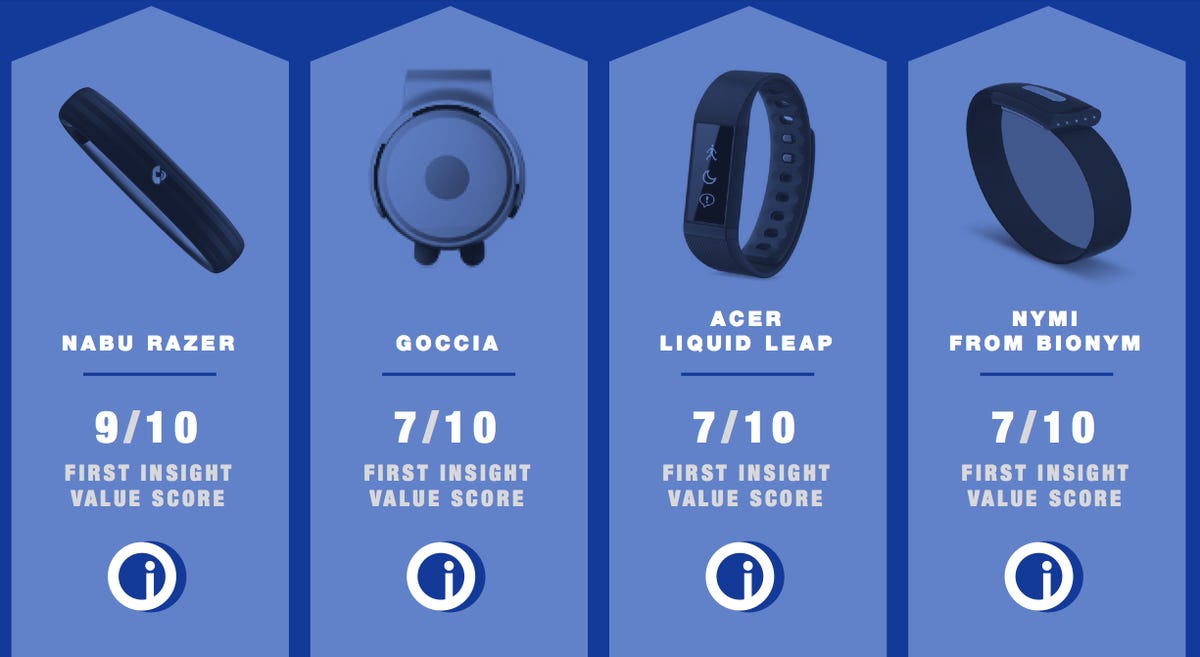
First Insight
A slew of new wearables are slated to hit shelves within the next few months — everything from the Samsung Simband health tracker platform to the OMsignal smart shirt to the Dash wireless earbuds.
In the finicky world of wearables, some of the products will please crowds while others will fade into obscurity. Predictive analytics platform First Insight released the results of a survey on Wednesday that looked at which wearables customers might prefer. The survey entailed asking 350 people in June their thoughts on 15 upcoming wearable products versus already released products.
The top choice was the Nabu Razer, a combined smartwatch and fitness band. Coming in second was a Kickstarter-backed tiny clip-on fitness tracker, the Goccia. And third place was a tie between the Acer Liquid Leap fitness band and a heartbeat band, the NYMI from Bionym (see full list below).
Why did these wearables beat out others in the survey? First Insight believes it has a lot to do with pricing — all of these top picks are expected to fall within a sweet spot price range of below $100. While design and function are important, says the firm, highly priced items may have a hard time moving from a niche to mainstream market.
“It’s a bit counterintuitive that value is a more critical factor than design, and price is a major component of the value of a product,” First Insight CMO Jim Shea said in a statement emailed to CNET. “Designers tend to think more about making something people will love instead of thinking about the price, but the value quotient — the combination of price and features — is a better predictor of whether or not a product will sell.”
Take The Dash earbuds — while people surveyed raved about the device’s capabilities and gave it the most positive feedback of any device, on average consumers are willing to pay only half of the earbuds’ $299 price tag.
Related stories
- The future of wearables: 8 predictions from tech leaders
- Wearable tech revenue to hit $19B by 2018
- Nike FuelBand’s wearable lesson not so clear-cut for Fitbit, Jawbone
- Fitbit rules 50 percent of the world’s wearable market
- Wearables are white-hot at CES 2014. So they’re doomed, right?
Of all of the types of wearables on the survey, fitness bands scored the highest. First Insight believes this is because of their lower pricing, which typically ranges from $75 to $125. Other conclusions from the report show that women will pay more for wearables but prefer smaller and sleeker devices.
While still a nascent industry, the wearables market has exploded over the past couple of years. Financial consultancy Deloitte predicts that 10 million units will sell this year, generating a total of $3 billion. And, by 2018, research firm Juniper Research believes, that figure will hit $19 billion.
For the survey, First Insight gave participants images and descriptions of the 15 wearable products, and then used a unique algorithm to predict a score of 1 to 10 based on participants’ answers. Ten was the best score, forecasting a sales success, and one was the lowest, predicting a flop. Any product with a score less than six will most likely not do well, says First Insight.
Here’s the full list:Nabu Razer, smartband, MSRP $75, Score: 9Goccia, fitness tracker, MSRP $80, Score: 7Acer Liquid Leap, fitness band, MSRP $99, Score: 7NYMI from Bionym, heartbeat band, MSRP $99, Score: 7Commbadge, hands-free speaker, MSRP $100, Score: 6The Rufus Cuff, smartwatch-smartphone hybrid, MSRP $279, Score: 5Ring, gesture control ring, MSRP $185, Score: 5Keyglove, wearable input device, MSRP $200, Score: 5OMsignal, smart shirt, MSRP $199, Score: 4Samsung Simband, health tracker platform, MSRP $349, Score: 4The Dash, earbuds, MSRP $299, Score: 4Cuff, smart bracelet, MSRP $150, Score: 3Bluetooth Nod Ring, device controller, MSRP $149, Score: 3Narrative Clip, camera, MSRP $279, Score: 3Recon Jet, sunglasses, MSRP $599, Score: 2
Correction, July 31 at 11:32 a.m. PT: Clarifies that survey participants were asked for feedback, not tested, with upcoming wearables.
Updated, July 31 at 2:35 p.m. PT: Clarifies that Samsung Simband is a wearable platform, which multiple devices can build on, rather than one single product.
Correction, August 1 at 9:40 a.m. PT: Clarifies that participants surveyed knew the brands of the products.



